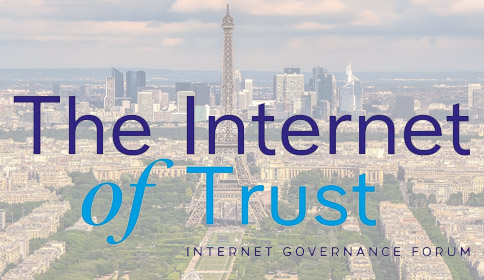Internet Governance Forum 2018

IEEE will participate in the 13th Annual Internet Governance Forum (IGF) hosted by the Government of France at the headquarters of UNESCO in Paris from 12 to 14 November 2018.
The Internet of Trust is the theme for this year’s multi-stakeholder event for dialogue regarding internet policies, initially convened in 2006 by the UN General Secretariat. With the UN’s renewal in December 2015, the IGF provides a platform to bring people together from various stakeholder groups as equals in discussions on public policy issues relating to the internet. While there is no negotiated outcome, the IGF informs and inspires those with policy-making power in both the public and private sectors. At this annual meeting delegates discuss and exchange information and share good practices with each other.
IEEE representatives will participate in the following panels and talks:
Connectivity Coalition Reception hosted by the IEEE Internet Initiative
11 November
The Connectivity Coalition was formed to accelerate internet inclusion for the betterment of humanity. The open and collaborative effort with participation from organizations’ experts from around the globe works to expand the impact of internet-inclusion projects worldwide by building local engineering capacity and connecting with other specialized skill sets.
IGF Workshop 428, Spectrum for Community Networks: A “Must” That is Hard to Get
12 November: 12:30-13:30 CET in Salle VII
Deepak Maheshwari, Director, Government Affairs – India, ASEAN & China, Symantec and Chair of IEEE Internet Initiative, will participate.
AI Ethics: Privacy, Transparency and Knowledge Construction
13 November: 16:40-18:10 CET in Salle VII
Panelist: Ansgar Koene, University of Nottingham, and working group chair for IEEE Standard for Algorithm Bias Considerations
Approaches to a Wicked Problem: Stakeholders Promote Enhanced Coordination and Collaborative, Risk-Based Frameworks of Regional and National Cybersecurity Initiatives
14 November: 09:20-10:50 CET in Salle II
Panelist: Greg Shannon, Chief Scientist for the CERT Division at Carnegie Mellon University’s Software Engineering Institute, and Vice Chair of IEEE Internet Initiative
Lightning Talk: Energizing Connectivity
14 November: 14:20-14:40 CET
Speaker: Bai Blyden, IEEE Smart Villages
In order to connect the unconnected, it is vital to consider innovative options to accomplish this goal. One such way to help accelerate connecting as many individuals as possible in a short timeframe is through the use of a Dig Once policy, where ICT infrastructure is installed in conjunction with other infrastructures such as power and water infrastructure.
How can we connect the next billions of new Internet users by 2020? With nearly 60 percent of humanity still lacking Internet access, the success of extending universal, affordable connectivity depends on the shared expertise, experiences, and creativity of the global technology, technical and policy communities. One way to help accomplish to accelerate connecting the unconnected is through the implementation of a Dig Once policy, where ICT infrastructure is installed in conjunction with other infrastructures such as power and water infrastructure.
For areas where it not feasible to provide cost effective traditional power, IEEE Smart Village stimulates development of new renewable electricity systems, start-up training and ongoing support to help poor, energy-deprived communities globally build toward sustainable prosperity. The inspiration for IEEE Smart Village stems from the IEEE-UN Foundation sponsored Humanitarian Challenge program of 2009-10 and the United Nations Sustainable Development Goals to eliminate the worst of global poverty by 2030.
Electricity is proven to be a major driver to eliminate the worst of poverty and build toward sustainable community prosperity. An estimated 1.4 billion people around the world today live without any access to electricity, and at least an equal number suffer from very poor quality and unreliable electricity. Lighting in these areas depends on kerosene lamps and candles which are expensive and emit harmful fumes. Cooking depends on burning wood and charcoal, also harmful and detrimental to environment. With even a moderate access to basic electricity, however, people in off-grid regions take a leap forward toward securing other critical services lacking in their communities: clean water, sanitation, health services, access to education, and access to markets for their produce and participation in the global economy. IEEE Smart Village addresses these profound needs with strategic partnerships in a new and sweeping way.


